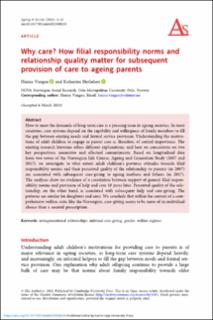Why care? How filial responsibility norms and relationship quality matter for subsequent provision of care to ageing parents
Peer reviewed, Journal article
Published version
Permanent lenke
https://hdl.handle.net/11250/3113441Utgivelsesdato
2023Metadata
Vis full innførselSamlinger
- NOVA andre dokumenter [94]
- Publikasjoner fra Cristin [3256]
Originalversjon
10.1017/S0144686X23000235Sammendrag
How to meet the demands of long-term care is a pressing issue in ageing societies. In most countries, care systems depend on the capability and willingness of family members to fill the gap between existing needs and formal service provision. Understanding the motiva- tions of adult children to engage in parent care is, therefore, of central importance. The existing research literature offers different explanations, and here we concentrate on two key perspectives: normative and affectual commitments. Based on longitudinal data from two waves of the Norwegian Life Course, Ageing and Generation Study (2007 and 2017), we investigate to what extent adult children’s previous attitudes towards filial responsibility norms and their perceived quality of the relationship to parents (in 2007) are associated with subsequent care-giving to ageing mothers and fathers (in 2017). The analyses show no evidence of a correlation between support of general filial respon- sibility norms and provision of help and care 10 years later. Perceived quality of the rela- tionship, on the other hand, is associated with subsequent help and care-giving. The patterns are similar for daughters and sons. We conclude that within the context of a com- prehensive welfare state, like the Norwegian, care-giving seems to be more of an individual choice than a societal prescription.

